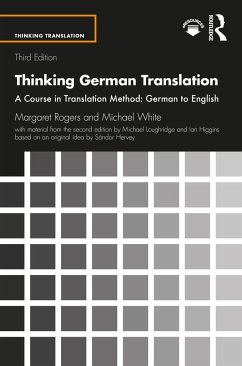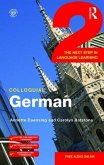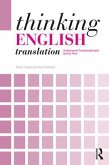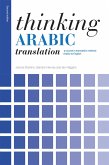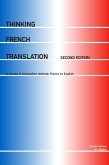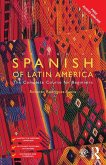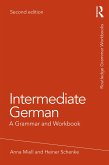Thinking German Translation is a comprehensive practical course in translation for advanced undergraduate students of German and postgraduate students embarking on Master's translation programmes. Now in its third edition, this course focuses on translation as a decision-making process, covering all stages of the translation process from research, to the 'rewriting' of the source text in the language of translation, to the final revision process.
This third edition brings the course up to date, referencing relevant research sources in Translation Studies and technological developments as appropriate, and balancing the coverage of subject matter with examples and varied exercises in a wide range of genres from both literary and specialised material. All chapters from the second edition have been extensively revised and, in many cases, restructured; new chapters have been added-literary translation; research and resources-as well as suggestions for further reading. Offering around 50 practical exercises, the course features material from a wide range of sources, including:
business, economics and politics
advertising, marketing and consumer texts
tourism
science and engineering
modern literary texts and popular song
the literary canon, including poetry
A variety of translation issues are addressed, among them cultural differences, genre conventions, the difficult concept of equivalence, as well as some of the key differences between English and German linguistic and textual features.
Thinking German Translation is essential reading for all students seriously interested in improving their translation skills. It is also an excellent foundation for those considering a career in translation.
A Tutor's Handbook offers comments and notes on the exercises for each chapter, including not only translations but also a range of other tasks, as well as some specimen answers. It is available to download from www.routledge.com/9781138920989.
This third edition brings the course up to date, referencing relevant research sources in Translation Studies and technological developments as appropriate, and balancing the coverage of subject matter with examples and varied exercises in a wide range of genres from both literary and specialised material. All chapters from the second edition have been extensively revised and, in many cases, restructured; new chapters have been added-literary translation; research and resources-as well as suggestions for further reading. Offering around 50 practical exercises, the course features material from a wide range of sources, including:
business, economics and politics
advertising, marketing and consumer texts
tourism
science and engineering
modern literary texts and popular song
the literary canon, including poetry
A variety of translation issues are addressed, among them cultural differences, genre conventions, the difficult concept of equivalence, as well as some of the key differences between English and German linguistic and textual features.
Thinking German Translation is essential reading for all students seriously interested in improving their translation skills. It is also an excellent foundation for those considering a career in translation.
A Tutor's Handbook offers comments and notes on the exercises for each chapter, including not only translations but also a range of other tasks, as well as some specimen answers. It is available to download from www.routledge.com/9781138920989.

